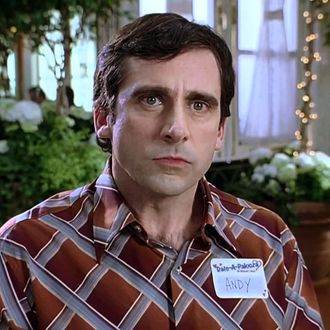
In 2014, Alexa Tsoulis-Reay interviewed a man from Paradise, California, who was at the time 58 years old, and still a virgin. The quote that ends the Q&A is heartbreaking: Asked what the hardest part of being a nearly-60-year-old virgin, the man responded, “Laying alone at night, falling asleep, and then getting up in the morning and remembering you’re alone.”
Typically, Americans lose their virginity around age 17, according to the most recent statistics. But what if it doesn’t happen then? What is dating like for the sexually inexperienced? New Kinsey Institute-led research in The Journal of Sex Research attempts to answer that, showing the awkward, bumbling 40-Year-Old Virgin trope is in reality a far more complicated existence.
In one experiment, the researchers — led by Amanda N. Gesselman of the Kinsey Institute at Indiana University — asked nearly 5,000 people (ages 18 to 76) if they would consider dating a virgin. Most of the people in the study who’d had sex before reported that they would not date a virgin — but but here’s where it gets really interesting: An even greater number of virgins said they, too, would not date someone who had not previously had sex. Younger people in their 20s were particularly less likely to say they would date a virgin — even though most virgins were in this age range —and women were more likely to report not wanting to date someone without sexual experience than men. Virgins, in other words, were themselves not attracted to other virgins and, in fact, sexually experienced people were more likely to date virgins than virgins themselves.
Armed with these survey results, the researchers interviewed 353 heterosexual participants and went one step further in the third, final aspect of the paper: What does it mean to be an actual virgin in a society that seemingly stigmatizes virginity? To find out, the researchers created fake online dating accounts listing various levels of sexual experience and asked the study volunteers to rate each fictitious person’s attractiveness. Virgins, it turned out, seem to flock together despite reporting that they weren’t necessarily interested in dating fellow virgins. Those with less sexual experience tended to rate the profiles of people who also had little sexual experience as more attractive, compared to their ratings of the profiles that indicated more sexual experience. The researchers argue that this may be an example of “assortative pairing” — that is, the notion that people tend to prefer potential sexual partners with a similar amount of experience to theirs.
Reasons for remaining a virgin are complex, and this study doesn’t delve into those. Some, like that of the writer of this recent, widely shared Establishment essay about being 33 and “never been kissed,” revolve around traditional views of attractiveness and a wish to have sex be saved for a meaningful relationship. Others abstain for religious reasons.
Beyond that, there are some other obvious shortcomings to the study. The virgins who were studied were between 18 and 26 — all older than 17, which, again, is the average Americans lose their virginity, but they were also younger than those relative few who make it to their 30s and beyond as virgins. (Data from the U.S. Centers for Disease Control indicates that just 1.9 percent of Americans in their early 30s have never had sex; by their late 30s, that drops to 0.9.) It also exclusively focuses on heterosexuals; those with other sexual orientations might have other barriers to sexual experience that aren’t considered here.
Regardless, the findings highlight what the researchers call a “new social sexual script”: Once considered a virtue, virginity may now be more of a liability for late bloomers, something that can often hold the sexually experienced back, even from each other.




